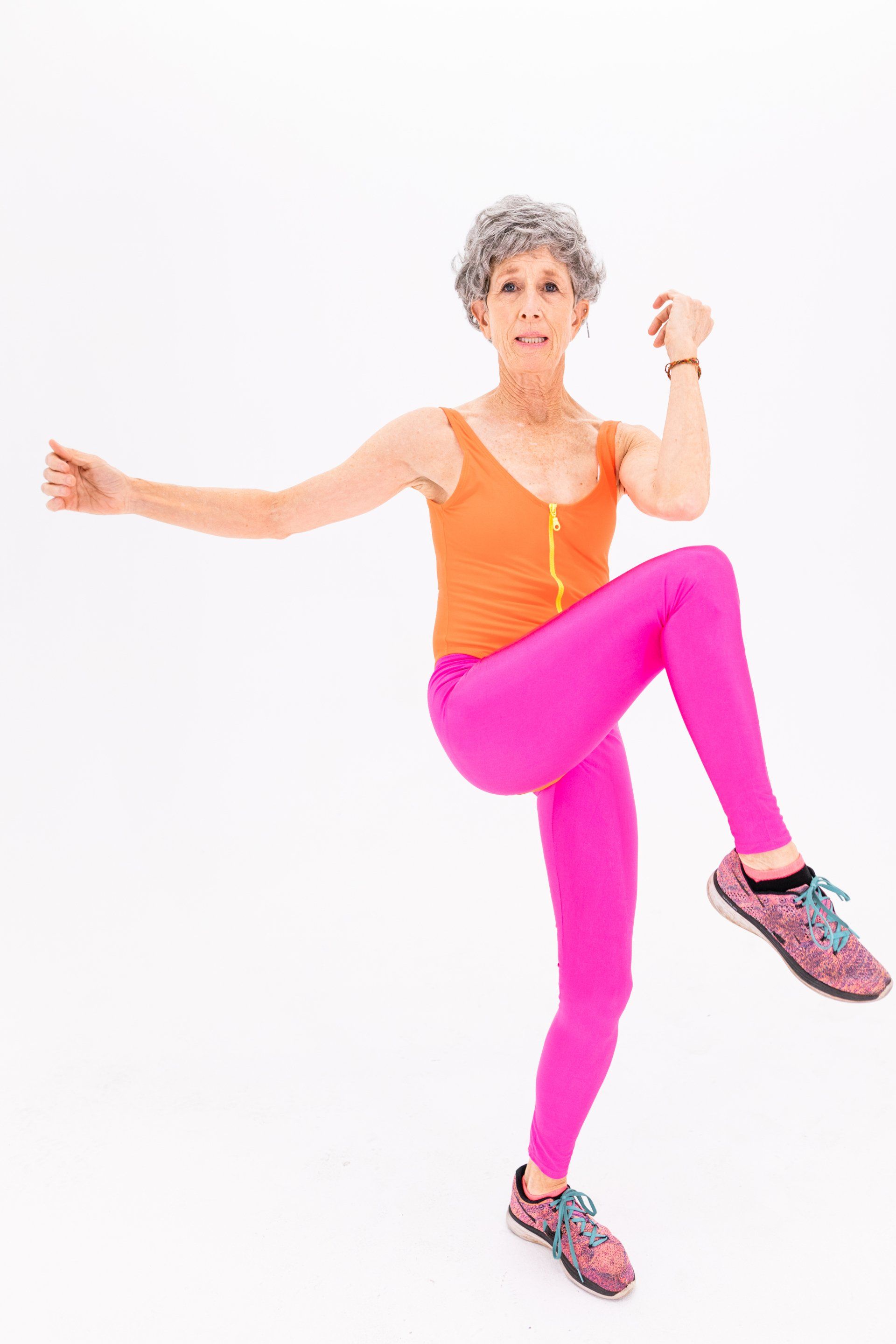Menopause wellness: Incorporating habits and exercise for balance
Menopause Wellness: Incorporating Habits and Exercise for Balance

Menopause is the natural end of an individual's menstrual cycle, which occurs when the ovaries stop producing eggs - it typically occurs between the ages of 45 and 55. With the end of the cycle comes a massive change in hormone production. The change in hormones during menopause can impact your mental health as well as your physical health, it's common to feel anxiety, stress or even depression.
So, what can cause this?
As individuals go through perimenopause, the levels of oestrogen in their bodies begin to decline. This can have several effects on the brain, including:
- Memory problems: Oestrogen helps to support the hippocampus, a part of the brain that is important for memory. When oestrogen levels decline, the hippocampus can shrink, leading to memory problems such as difficulty remembering names, dates, and events.
- Brain fog: Perimenopause can also cause brain fog, which is a feeling of confusion and forgetfulness. This is thought to be due to the decline in oestrogen, which also affects other brain functions such as concentration and decision-making.
- Mood swings: Oestrogen also plays a role in regulating mood. When oestrogen levels decline, it can lead to mood swings, such as irritability, anxiety, and depression.
- Insomnia: Oestrogen helps to regulate the sleep-wake cycle. When oestrogen levels decline, it can lead to insomnia, which can further contribute to fatigue and brain fog.
In addition to these cognitive symptoms, perimenopause can also affect the limbic system, which is the part of the brain that is responsible for emotions. The limbic system includes the amygdala, which is responsible for processing emotions such as fear and anger. When oestrogen levels decline, the amygdala can become more sensitive, leading to increased anxiety and irritability.
Things You Can Do to Help Alleviate Symptoms
- Get plenty of rest: Aim for 7-8 hours of sleep per night. Create a relaxing bedtime routine and avoid caffeine and alcohol before bed.
- Eat a healthy diet: Eat plenty of fruits, vegetables, and whole grains. Choose lean protein sources and healthy fats. Avoid processed foods and sugary drinks.
- Get regular exercise: Aim for at least 30 minutes of moderate intensity exercise most days of the week. Exercise can help to improve mood, reduce hot flashes, and boost energy levels.
- Do relaxing things you enjoy: Spend time doing activities that you find relaxing, such as yoga, meditation, or spending time in nature.
- Talk to other women going through the menopause: Talking to other women who are going through the same thing can be helpful and supportive. You can share experiences, tips, and advice.
Can a healthy diet help menopause symptoms?
The good news is that a healthy, varied diet and a healthy lifestyle before, during and after menopause can help protect our bone density, reduce the risk of heart disease, and support a healthy weight.
- Vitamin B6- Supports the regulation of hormonal activity, its found in foods such as meat, poultry, fish, fortified breakfast cereal and egg yolk.
- Calcium and vitamin D- Helps reduce the loss of bone mineral density in postmenopausal women, helps reduce the loss of bone mineral density. Calcium can be found in Milk, cheese, yogurt, fromage frais, some green leafy vegetables (such as kale), calcium-fortified dairy alternatives, canned fish (where soft bones are eaten) and breads. Vitamin D: Oily fish, eggs, fortified breakfast cereals and fat spreads
- Magnesium- Contributes to the reduction of tiredness and fatigue. Its found in foods such as Nuts and seeds ( Brazil nuts and sunflower seeds), wholegrain breakfast cereals, wholegrain and seeded breads, brown rice, and quinoa.
- Pantothenic Acid (Vitamin B5)- Contributes to normal mental performance its found in foods such as whole-grains, green vegetables, tomatoes, potatoes, and dairy.
- Zinc-Helps contribute to the maintenance of skin, hair, and nails. Can be found in meat, poultry, cheese, some shellfish (such as crab, cockles, and mussels), nuts and seeds (such as pumpkin seeds and pine nuts), wholegrain breakfast cereals and wholegrain and seeded breads.
- Thiamine (vitamin B1)-Contributes to normal heart function, can be found in foods such as Bread, fortified breakfast cereals, nuts and seeds, meat (especially pork), beans and peas
What habits can help with my menopause symptoms?
Regular exercise during and after menopause can help to manage a variety of symptoms and improve overall health and well-being.
- Cardiovascular health: Exercise can help to improve cardiovascular health by lowering blood pressure, cholesterol, and blood sugar levels. It can also help to reduce the risk of heart disease, stroke, and type 2 diabetes.
- Bone health: Exercise can help to prevent bone loss and osteoporosis, which are common problems in women after menopause. Strength-training exercises are particularly beneficial for bone health.
- Mental health: Exercise can help to improve mood, reduce anxiety and depression, and boost energy levels. It can also help to improve sleep quality.
- Weight management: Exercise can help to burn calories and lose weight, which can be helpful for women who are trying to manage their weight during menopause.
Types of Exercise for Menopause
There are many different types of exercise that can be beneficial for women during menopause. Some popular options include:
- Cardiovascular exercise: This includes activities that get your heart rate up, such as walking, running, swimming, biking, and dancing. Aim for at least 30 minutes of moderate-intensity cardiovascular exercise most days of the week.
- Strength-training exercise: This includes activities that help to build muscle, such as lifting weights, doing bodyweight exercises, and using resistance bands. Aim for at least 2-3 strength-training sessions per week.
- Yoga and Pilates: These types of exercises can help to improve flexibility, balance, and core strength. They can also be helpful for managing stress and anxiety.
- Tai chi: This type of exercise combines slow, gentle movements with meditation. It can be helpful for improving balance, flexibility, and coordination.
How to Get Started with Exercise
If you are new to exercise, start slowly and gradually increase the intensity and duration of your workouts over time. It is important to find activities that you enjoy and that you can stick with. Talk to your doctor before starting any new exercise program, especially if you have any health conditions.
Here are some tips for getting started with exercise during menopause:
- Find an activity that you enjoy. This will make it more likely that you will stick with it.
- Start slowly and gradually increase the intensity and duration of your workouts over time.
- Listen to your body and take breaks when you need them.
- Stay hydrated by drinking plenty of fluids before, during, and after your workouts.
- Wear comfortable clothing and shoes.
- Find a workout buddy to help you stay motivated.
Give up Smoking!
Giving up smoking is one of the best things you can do for your general health. Smoking can increase the likelihood of experiencing menopause symptoms such as hot flushes, night sweats and headaches.
Reach out and don’t isolate yourself:
It's important to realise you are not alone and there are millions of other women going through menopause symptoms, they are lots of support groups you can access via the NHS, if it's affecting work tell your employer you are going through the menopause, most companies have menopause awareness policies in place.
Hope this helps and always speak to a GP to ensure you have all the support you need.
If you would like a personalised health report, you can take our free quiz here.



